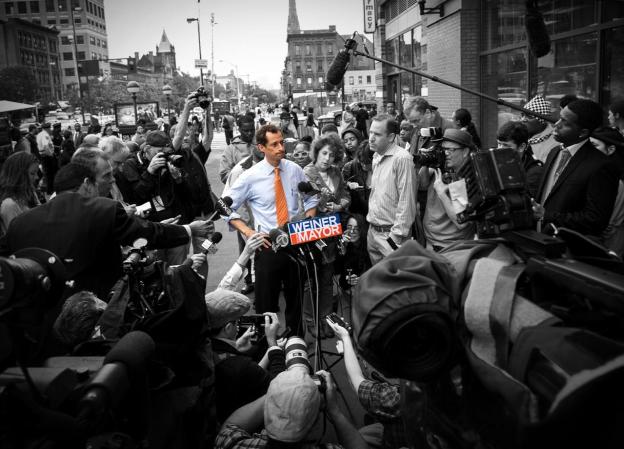
When you think of former U.S. congressman Anthony Weiner, what’s the first thing that comes to mind?
If you said “penis joke,” you have company. The passionate Democratic politician – who resigned from Congress nearly two years ago, after a young woman blew the whistle on his penchant for tweeting and emailing pictures of Weiner Jr. to women other than his wife – officially announced his candidacy for mayor of New York City last week, via YouTube. And so far, all anyone can talk about is whether voters will look past his throbbing indiscretions and give him a chance at a comeback. Shocker, I know.
It is far too early to tell whether Weiner has a chance at winning NYC. But whatever you think about him running for King of the Big Apple – if you think about it at all – one thing has “certain” scribbled all over it: We will one day see Weiner as a trailblazer for the next generation of politicians; the young men and women who have come of age, and will come of age, with the Internet and all the other tools of embarrassment that come with it.
For us voters, his moonshot for political redemption primes us for a future in which we must constantly decide whether a foolish tweet, damning Facebook photo, or tactless forum joke are enough to disqualify someone from the running.
We must all come to terms with this because many of us who have been online most our lives took far too long to realize exactly how to conduct ourselves on the Web – some of us still haven’t figured it out. We brush aside warnings about a lack of privacy online, and fail to take seriously the maxim “once on the Internet, always on the Internet.” And the kids and teenagers who haven’t yet realized their impending political ambitions have even more to loose.
Many of the politicians currently in office rose to power during an entirely different time. Every whim they had as an angst-riddled teen was not posted for all to see, forever. They could attend a booze-fueled party during their college days without hundreds of photos from the shindig ending up on Facebook. As Google Chairman Eric Schmidt explained at the Telegraph’s Hay Festival on Saturday, “We have never had a generation with a full photographic, digital record of what they did.”
Now we do. The upcoming generation lacks the luxury of private lives – they are constantly monitored, recorded, tagged, and shared. Who knows how that information could be used against them by future opponents? (The answer, of course, is any way it can be used.)
No matter how conscientious the upcoming generation is, we as a nation are sure to have our share of Weiners.
It’s also safe to assume that many (but certainly not all) of the kids that go on to become worthy political leaders have better sense than the majority of their peers. These are the kids that excel at school, volunteer in their free time, devote themselves to sports or music, and are planning from elementary school to become “someone important.” Hopefully this type of diligence also translates into not getting too comfortable with Snapchat.
Then again, one could argue that the failure of future politicians to protect their privacy now benefits us all later. Rather than childhood shenanigans getting swept under the rug, we as a society will have the unprecedented benefit of knowing ash piles of gritty details about candidates – few behaviors, good or bad, will go uncovered. Transparency – intentional or not – disinfects.
No matter how conscientious the upcoming generation is, we as a nation are sure to have our share of Weiners – those with political ambitions whose recklessness can be easily documented by anyone with quality Google skills. And it will be up to us to decide where we draw the line. Do we render someone unelectable because she once posted a picture of herself taking a bong rip during spring break? Is someone un-American because they once “liked” a Karl Marx Facebook page? This kind of dirt will come up in future elections. It is up to us to decide how much we care.
Of course, we will likely never trust someone who did exactly what Anthony Weiner did – condemnation of infidelity, digital or otherwise, isn’t going anywhere. But his candidacy does offer us (or New Yorkers, at least) the opportunity to consider how we will handle thoughtless online behavior in the future – because, whether we like it or not, penis pic politics is here to stay.


